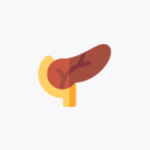Pancreas Transplant in Pune
Reclaiming Control and Achieving Balance: Pancreas Transplant Expertise
The pancreas transplant is a surgical intervention designed to replace a dysfunctional pancreas with a healthy organ from a deceased donor. Its primary application offers a potential cure for patients diagnosed with type I diabetes. Nevertheless, due to the significant side effects associated with the transplant, it is generally reserved for individuals with severe complications arising from diabetes.
Team
Looking for the Pancreas Transplant in Pune
When Do You Need Pancreas Transplant?
The functionality of the pancreas may be compromised by various conditions, necessitating the consideration of a pancreas transplant. While this intervention holds promise as a potential cure for individuals with type I diabetes, the decision to undergo a pancreas transplant involves careful assessment of the trade-off between the benefits of the transplant and the side effects associated with post-transplant anti-rejection medications. Typically, individuals experiencing one or more of the below-listed conditions may find a pancreas transplant to be a viable solution. The following are some of these related conditions:
- Uncontrolled Type I diabetes despite standard treatment
- Type II diabetes characterized by both low insulin production and low insulin resistance
- Inadequate control of blood sugar levels
- Recurrent severe insulin reactions
- Hypoglycemia unawareness
- Severe kidney damage
Various Kinds of Pancreas Transplants
The approach to pancreas transplant procedures varies depending on the specific circumstances and conditions of the patient. The following are instances where a pancreatic transplant might be warranted:

Need for only Pancreas Transplant:
Patients with diabetes and minimal or no kidney disease may be eligible for a standalone pancreas transplant.

Combined Kidney-Pancreas Transplant:
Surgeons often consider combined kidney-pancreas transplants for diabetes patients with existing or high-risk kidney failure. This typically involves simultaneous pancreas and kidney transplants, aiming to provide the patient with both a healthy pancreas and kidney to minimize the risk of diabetes-related kidney damage.

Pancreas-After-Kidney Transplant:
For patients awaiting both pancreas and kidney donors, a kidney transplant may be recommended first if a suitable living or deceased-donor kidney becomes available. Following the kidney transplant, a pancreas transplant is performed once a donor pancreas becomes available.

Pancreatic Islet Cell Transplant:
In this procedure, insulin-producing cells (islet cells) from a donor's pancreas are extracted and injected into a vein leading to the liver. Multiple injections of transplanted islet cells may be required.
Costs
Stay at Hospital
Back to work
Waiting Period
Finding a suitable donor can be challenging within a short timeframe. Typically, the pancreas is obtained from an individual declared brain-dead but kept on life support. The donor must meet specific transplant criteria, including good health and a specific age range. Additionally, the donor's organ must immunologically match that of the recipient’s to minimize the risk of organ rejection.
In certain cases, the pancreas may be sourced from a living donor, especially if the recipient is a compatible twin or close relative with an immunological match. In such instances, the donor contributes a portion of their pancreas rather than the entire organ. During the waiting period for a suitable donor, it is crucial to take proactive measures for self-care by:
- Regularly attending doctor check-ups and follow-ups.
- Maintaining a healthy, balanced diet.
- Taking all prescribed medications on time.
- Engaging in some form of physical activity as recommended by the doctor.
- Avoiding smoking and alcohol consumption.

Do You Have Any Query
Please fill out the form & our representative will contact you within 24hrs.
















 View Map
View Map Book an Appointment
Book an Appointment Find a Doctor
Find a Doctor Health Check-up
Health Check-up



 Find a Doctor
Find a Doctor Health Checkup
Health Checkup Book an Appointment
Book an Appointment